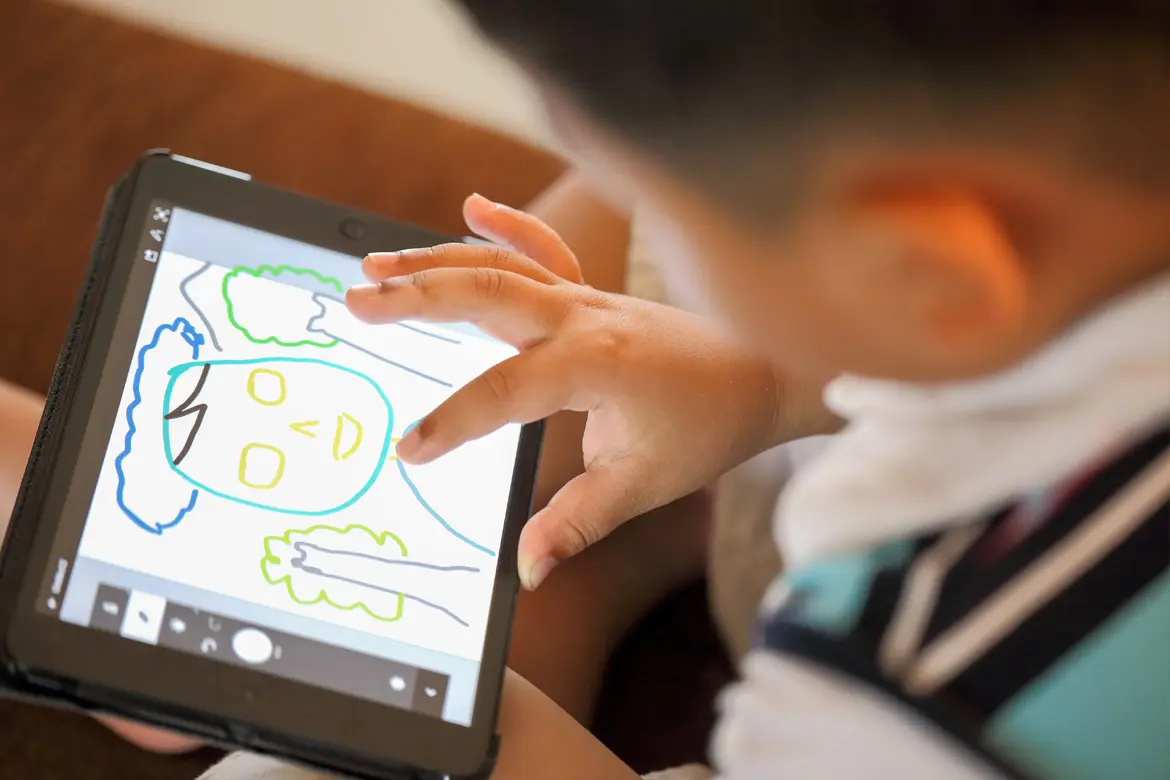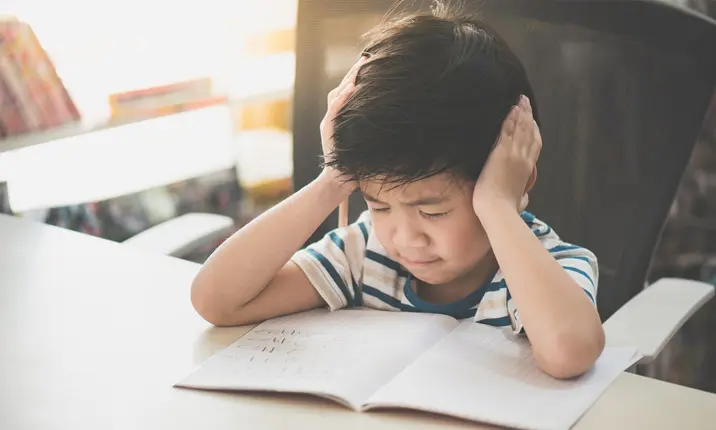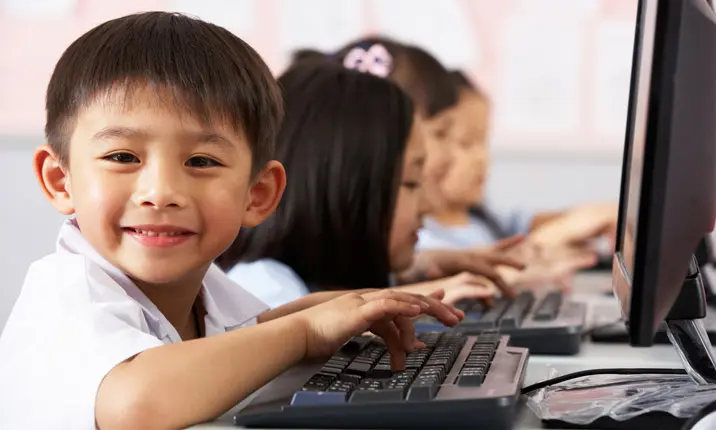

Source: Shutterstock
What Is the Recommended Screen Time for Children?
Last updated: Wednesday, January 5, 2022 | 5 min reading time
The World Health Organisation (WHO) recently released new guidelines on recommended screen time for children. So how much screen time is too much?
The world relies heavily on technology and electronic screens are now an integral part of our daily lives. Researchers have long raised concerns about the impact of screen time on both adults and children, and it's not surprising that many parents aren't sure about what is best when it comes to their children and technology. While it's nearly impossible for anyone to avoid screens altogether, it can be a good idea to impose some limits.
Effects of screen time on child development
Studies show that the artificial light and flickering images on a screen can overstimulate certain areas of your children's brains. This can lead to the following:
- Attention deficit
- Lack of exercise
- Sleep disturbances
- Lower energy levels
- Poor performance in school
- Poor quality sleep
- Strained eyes
- Stress or anxiety
Excessive screen time is also connected with a decrease in active play, which is essential for your child's learning and development. When your child sits in front of a screen, they may not have the chance to exercise their critical problem-solving skills as nature intended.
Studies comparing MRI scans of children's brains have revealed differences between children who use smartphones, tablets and play video games daily compared those who do not. One published study indicated that white matter, which acts as fibres connecting various parts of the brain, were underdeveloped and more disorganised in preschool children who had more than one hour of screen time per day. Children who had excess screen time also scored significantly lower on cognitive thinking and language tests.
Similar side effects can be seen in adults, with screen exposure affecting sleep habits, relationships, mood, and fitness.
Recommended screen time for children
The recent WHO guidelines for children under 5 are based on a combination of reduced screen time and an increase in physical activity.
| Age | Screen Time Recommendation | Activity Recommendation |
|---|---|---|
| Below 1 year | • None | • Varied physical activity every day including interactive play or at least 30 minutes of tummy time for infants who are not yet mobile. • Should not be restrained in a high chair or pram for more than one hour at a time. |
| 1 – 2 years | • None for one-year olds • Less than one hour for two-year olds |
• Varied physical activity every day of different intensity, for at least 180 minutes throughout the day. • Should not be restrained in a high chair or pram for more than one hour at a time. |
| 3 – 4 years | • Less than one hour for two-year olds | • Varied physical activity every day of different intensity, for at least 180 minutes throughout the day. • Should not be restrained in a high chair or pram for more than one hour at a time. |
At 5 years and older, a little more screen time may be introduced, but it should still be limited to no more than a few hours of exposure.
Doctors generally suggest that the less screen time, the better, from childhood through to adulthood.
How to limit screen time for children
Limiting screen time can be challenging if your children are used to a free reign over electronic devices. With very young children, it's easier to impose these guidelines and cultivate good screen time habits. For older children, the best thing to do is to explain to your child the effects of long screen time, and offer alternative activities that you know they will enjoy.
Steps you can take to limit your child's screen time:
- Avoid using your own electronic devices excessively in front of your child
- Engage in activities with young children like reading, singing, puzzles and story time
- Encourage outdoor activities like bike rides, walking, and outdoor play
- Have a set time each day for TV, computer or tablet time, so your child knows when they can use them
- Impose a cut-off for all electronics one hour before bed time
- Keep electronics out of sight
- Organise social activities like play dates for your child
- Consult your child's teacher or caregiver on monitoring your child's screen time at school
Parental controls for children's screen time and online safety
There are several things you can do to limit your child's screen time and also help to prevent exposure to unsafe or inappropriate content. Experts recommend steps like these:
- Set parental controls on your devices and commonly used apps like YouTube and Netflix to prevent exposure to inappropriate content.
- Lock devices with a passcode or setting an alarm or timer to signal the end of their screen time.
- Preview any websites, games or applications before you allow your child to play them.
- Disallow downloading of games and other software without permission.
- Only allow screen time in a public area of the home so that you can supervise their usage.
As your children grow older, explain that technology can be used for good but it also comes with dangers. You should have age-appropriate conversations about digital safety which include:
- Protecting privacy by not sharing personal information such as addresses, telephone numbers, photos, and locations.
- Warning against communicating with strangers online
Tips for your child's healthy development
Although the use of electronics is ultimately inevitable and there are many mind-stimulating games beneficial for a child's development, there are plenty of things you can do to ensure your child has a healthy lifestyle. Focus on physical activity, mental stimulation and a balanced diet.
Balanced diet
Give your child a fresh, whole food diet with lots of lean meat, vegetables, fruit, and healthy fats and carbs. Limit or cut out processed foods and soft drinks and make sure they get plenty of water.
Mental stimulation
Keep your child focused with activities to improve their cognitive skills. Language exercises, reading and writing are all important for older children. Puzzle books and mind games are a fun way to get them thinking. Young children can play with basic toys like blocks and shape finders.
Physical activity and exercise
Walking, running and playing outside are easy ways for your child to get enough exercise. You can also enrol them in a regular class such as swimming, dancing, karate or soccer. Young children need lots of free play on the floor with toys to encourage mobility so they can develop hand-eye coordination.
How much screen time is too much for kids?
Daily use of digital devices and the risks of excessive screen time is relatively new and the long-term risks are still being researched. However, the available evidence indicates that exceeding the recommended screen time for children can cause health risks such as obesity and behavioural problems in the long term.
The safest thing for you and your child is to impose restrictions and encourage other, healthier outlets for their energy. If you have any concerns about your child's behaviour or learning, you should see your doctor or paediatrician for advice.
(n.d.) Can Too Much Screen Time Hinder Child Development? Retrieved 11 July 2019 from https://www.webmd.com/parenting/news/20190128/can-too-much-screen-time-hinder-child-development#1
(2 October 2018) More Than 2 Hours of Screen Time May Affect Kids Brains. Retrieved 11 July 2019 from https://www.healthline.com/health-news/more-than-2-hours-of-screen-time-can-hurt-kids-brains
(19 December 2018) Is Screen Time Altering the Brains of Children? Retrieved 11 July 2019 from https://www.healthline.com/health-news/how-does-screen-time-affect-kids-brains
(29 April 2019) To grow up healthy, children need to sit less and play more. Retrieved 11 July 2019 from https://www.who.int/news-room/detail/24-04-2019-to-grow-up-healthy-children-need-to-sit-less-and-play-more
(4 November 2019) MRIs show screen time linked to lower brain development in preschoolers. Retrieved 17 December 2021 from https://edition.cnn.com/2019/11/04/health/screen-time-lower-brain-development-preschoolers-wellness/index.html
(24 April 2019) New WHO guidelines on physical activity, sedentary behaviour and sleep for children under 5 years of age. Retrieved 17 December 2021 from https://www.who.int/news/item/24-04-2019-to-grow-up-healthy-children-need-to-sit-less-and-play-more
(14 October 2021) Children's Safety in a Connected World. Retrieved 17 December 2021 from https://www.safehome.org/resources/kid-safety-digital-age/
(2 November 2021) Internet Safety for Kids. Retrieved 17 December 2021 from https://www.consumernotice.org/data-protection/internet-safety-for-kids/
(2 October 2018) More Than 2 Hours of Screen Time May Affect Kids Brains. Retrieved 11 July 2019 from https://www.healthline.com/health-news/more-than-2-hours-of-screen-time-can-hurt-kids-brains
(19 December 2018) Is Screen Time Altering the Brains of Children? Retrieved 11 July 2019 from https://www.healthline.com/health-news/how-does-screen-time-affect-kids-brains
(29 April 2019) To grow up healthy, children need to sit less and play more. Retrieved 11 July 2019 from https://www.who.int/news-room/detail/24-04-2019-to-grow-up-healthy-children-need-to-sit-less-and-play-more
(4 November 2019) MRIs show screen time linked to lower brain development in preschoolers. Retrieved 17 December 2021 from https://edition.cnn.com/2019/11/04/health/screen-time-lower-brain-development-preschoolers-wellness/index.html
(24 April 2019) New WHO guidelines on physical activity, sedentary behaviour and sleep for children under 5 years of age. Retrieved 17 December 2021 from https://www.who.int/news/item/24-04-2019-to-grow-up-healthy-children-need-to-sit-less-and-play-more
(14 October 2021) Children's Safety in a Connected World. Retrieved 17 December 2021 from https://www.safehome.org/resources/kid-safety-digital-age/
(2 November 2021) Internet Safety for Kids. Retrieved 17 December 2021 from https://www.consumernotice.org/data-protection/internet-safety-for-kids/
 Brain & Spine Care
Brain & Spine Care











